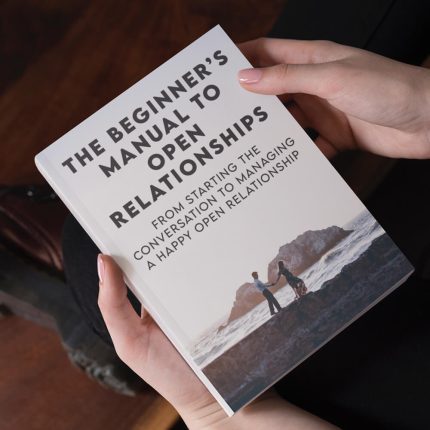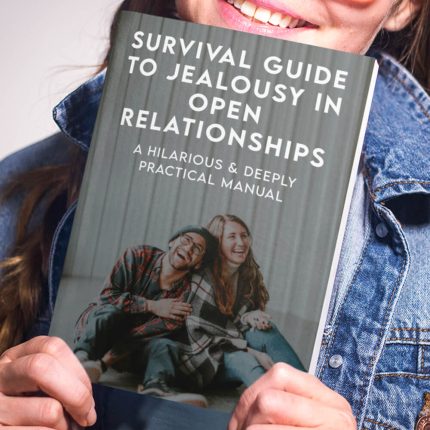Welcome, free spirits and equality enthusiasts! If you’ve ever dreamed of a love life where every connection is celebrated on its own merit—without a built-in “primary” or “secondary” label—then you’re in the right place. This guide is your ultimate roadmap to non-hierarchical polyamory, a relationship style that champions equal footing for every partner. Get ready to explore a world where communication, consent, and mutual respect & trust create a level playing field for love!
Useful Interruption: Not sure which relationship vibe fits you best? Take our Relationship Test, it’ll give you the real insight into your natural relationship style. Then, dive into our binge-worthy guides (from the tried-and-true to the “wait, that’s a thing?”) and find the perfect relationship type for your life:
- Monogamy
- Open Relationships
- Ethical Non-Monogamy
- Solo Polyamory
- Non-Hierarchical Polyamory
- Hierarchical Polyamory
- Relationship Anarchy
- Swinging
Now back to the main article but yeah take the test...
Understanding Non-Hierarchical Polyamory: The Egalitarian Approach
What Is Non-Hierarchical Polyamory?
Non-hierarchical polyamory is a relationship model in which all partners are regarded as equal, with no designated “primary” partner. In this approach, each connection is valued on its own, without a built-in ranking system. Imagine a vibrant community of relationships where every member gets an equal share of the spotlight—no one is the star while the others play supporting roles.
This model is all about dismantling traditional relationship hierarchies and embracing an egalitarian way of loving. Key terms like egalitarian polyamory, non-hierarchical relationships, and equal partnership capture the essence of this approach.
How It Differs from Hierarchical Polyamory
In hierarchical polyamory, one partner is often designated as primary, with other relationships considered secondary. Non-hierarchical polyamory, on the other hand, rejects this ranking system altogether. Every partner is invited to co-create a mutually supportive, open, and transparent relationship structure.
This doesn’t mean that challenges don’t exist—it simply means that everyone’s voice carries the same weight. The focus is on shared decision-making, open dialogue, and a commitment to treating all connections with equal care.
Historical Context and Cultural Shifts
While non-monogamy has ancient roots across various cultures, the egalitarian twist of non-hierarchical polyamory is a more recent evolution. As our society increasingly values equality and individual autonomy, many are rethinking traditional relationship models. The rise of feminist theory, LGBTQ+ advocacy, and digital connectivity has all paved the way for a more inclusive, non-hierarchical approach to love.
Today, non-hierarchical polyamory is celebrated for its ability to dismantle power imbalances and foster truly collaborative relationships. It’s a love revolution where every partner gets an equal say!
Models and Variations: Embracing Equality in Every Connection
Different Flavors of Non-Hierarchical Polyamory
Non-hierarchical polyamory isn’t a one-size-fits-all model—it can be customized to fit the unique needs of everyone involved. Here are a few variations:
- Egalitarian Relationships: Every partner is equal in decision-making, time, and emotional investment. There’s no “main” partner; instead, each relationship is treated as equally important.
- Fluid Arrangements: Some people prefer to keep their relationships loosely defined, allowing for organic growth without predetermined labels or ranks.
- Context-Dependent Equality: In some cases, while all partners are considered equal, the dynamics may shift based on situational needs or life stages, always with mutual agreement.
No matter which variation resonates with you, the core principle remains the same: love, respect, and decision-making power are shared equally among all involved.
EXPLORE OUR ETHICAL NON-MONOGAMY & OPEN RELATIONSHIP SHOP
👨💻👩💻 Digital Store (Instant Download)
🍆💦 Clothing Store (Worldwide Delivery Available)
Three Isn't a Crowd Unisex T-Shirt (White)
$29.99Three Isn't a Crowd Unisex T-Shirt (Black)
$29.99I Love Watching Pop Art T-Shirt (Black)
$29.99I Love Watching Pop Art T-Shirt (White)
$29.99Sharing Is Caring Unisex T-Shirt (Black)
$29.99Fuck Each Other Not The Planet Unisex T-Shirt (White)
$29.99Sharing Is Caring Daddy Cap (Black)
$39.99Real Men Share Pop Art T-Shirt (White)
$29.99It's Not Cheating If He Watches T-Shirt (Black)
$29.99Fuck Each Other Not The Planet Unisex T-Shirt (Black)
$29.99Real Men Share Pop Art T-Shirt (Black)
$29.99Multiple Lovers - Sharing Is Caring Unisex T-Shirt (Black)
$29.99A Quick Video Explanation
Communication and Boundaries: The Cornerstones of Equal Love
Why Open Communication is Essential
In non-hierarchical polyamory, communication isn’t just a tool—it’s the very lifeblood of every relationship. Without a ranking system to default to, every partner must be proactive in expressing their needs, desires, and concerns.
Effective communication strategies include:
- Regular Check-Ins: Schedule one-on-one and group conversations to ensure everyone is on the same page.
- Using “I” Statements: This fosters non-judgmental dialogue. For example, “I feel...” keeps conversations personal and prevents blame.
- Active Listening: Show empathy by truly hearing what each partner has to say. Sometimes, silence is as powerful as words.
- Embrace Humor: Laugh together at the absurdities and celebrate your unique love mosaic.
Setting and Respecting Boundaries
Boundaries are the invisible guidelines that help keep your relationships balanced and fulfilling. In a non-hierarchical setup, clear boundaries ensure that all partners feel respected and valued.
- Discuss Expectations Early: Lay out what you need in terms of time, emotional support, and personal space.
- Be Specific and Flexible: Clearly define boundaries but remain open to revisiting and revising them as relationships evolve.
- Mutual Respect: Ensure that everyone agrees to and honors these boundaries. This is the bedrock of trust.
Consent, Ethics, and Trust: Building a Solid Foundation
Ongoing Consent and Transparency
In non-hierarchical polyamory, consent is an ongoing, enthusiastic conversation. Every new connection or change in dynamics should be discussed openly with all parties involved. Think of it as a living contract—one that’s renewed regularly through honest dialogue.
Transparency is not optional; it’s essential. By being upfront about your feelings and intentions, you foster an environment where trust can flourish.
Maintaining Ethical Standards
Ethical non-monogamy in an egalitarian context means treating all partners with fairness, respect, and consideration. When every relationship is given equal weight, ethical behavior becomes the glue that binds you together.
This means:
- Being honest about your expectations and desires.
- Keeping all partners informed of any changes.
- Ensuring that all decisions are made collectively whenever possible.
Emotional and Psychological Benefits of Non-Hierarchical Polyamory
Deepening Self-Awareness and Personal Growth
Engaging in non-hierarchical polyamory can lead to significant personal growth. With each relationship, you learn more about your own needs, desires, and boundaries. This journey of self-discovery often results in increased self-awareness, emotional resilience, and a greater capacity for empathy.
The egalitarian nature of this model means that every connection challenges you to be your authentic self, and that kind of vulnerability is a powerful catalyst for personal transformation.
Enhancing Emotional Flexibility
By sharing your heart with multiple partners on equal footing, you cultivate a rich tapestry of emotional experiences. This diversity can help you become more adaptable, open-minded, and supportive—not only in your romantic life but in every area of your life.
The skills you develop in navigating multiple relationships—such as conflict resolution, empathy, and active listening—are invaluable tools for personal development.
Challenges and How to Overcome Them
Navigating Jealousy and Insecurity
Even in an egalitarian relationship, feelings of jealousy or insecurity can arise. The key is to address these emotions head-on. Recognize them, discuss them openly, and use them as opportunities for growth rather than letting them fester.
- Self-Reflection: Understand the root causes of your feelings. Journaling or talking to a trusted friend can help.
- Open Dialogue: Regularly check in with your partners to ensure everyone feels secure.
- Humor and Empathy: Sometimes a little laughter can defuse tension and remind everyone of your shared commitment.
Dealing with External Judgments
Society doesn’t always understand non-traditional relationship models. You might face criticism or misunderstanding from family, friends, or colleagues. The best way to handle this is to build a strong support network of like-minded individuals who appreciate your lifestyle.
Educate others when you feel comfortable doing so, but remember: your relationship choices are yours alone. Stand tall in your truth!
Maintaining Balance and Avoiding Burnout
With multiple relationships on the go, it’s easy to feel stretched thin. Prioritize self-care and ensure you’re not overcommitting yourself. Remember, quality always trumps quantity when it comes to emotional investment.
Set aside regular “me time” to recharge, and be mindful of your limits. A well-balanced love life is one where every partner—and your own needs—are honored.
Practical Guidance: Building Your Egalitarian Love Life
Steps to Embrace Non-Hierarchical Polyamory
Ready to dive into non-hierarchical polyamory? Here’s your step-by-step guide:
- Educate Yourself: Read books, listen to podcasts, and explore online forums about egalitarian polyamory. Understanding the theory and real-life applications is crucial.
- Have Honest Conversations: Discuss your desires and boundaries with potential partners. Transparency from the start sets a strong foundation.
- Create a Communication Plan: Whether it’s regular check-ins or scheduled group chats, plan for how you’ll stay connected and aligned.
- Set Clear Boundaries: Define what you need to maintain your independence and ensure mutual respect in every relationship.
- Seek Out Community: Join local meetups or online groups that support non-hierarchical polyamory. Learning from others’ experiences can be both enlightening and reassuring.
- Be Patient: Building and nurturing multiple equal relationships takes time and effort. Celebrate small victories along the way!
Real-Life Stories: Living the Egalitarian Dream
Let’s get inspired by some real-life accounts of non-hierarchical polyamory:
- Casey’s Circle: Casey, a long-time practitioner of egalitarian poly, shares how clear communication and mutual respect have helped maintain deep connections with three partners—all without any “primary” label. Regular “relationship roundtables” have become a cherished ritual, ensuring everyone feels heard.
- Jordan’s Journey: Jordan discovered that by embracing non-hierarchical polyamory, they could nurture diverse emotional bonds that enriched their life in unexpected ways. “Every relationship teaches me something new about myself,” Jordan says, “and that’s the beauty of it.”
These stories remind us that non-hierarchical polyamory is not about perfection—it’s about growth, connection, and the joy of loving without limitations.
Research, Data, and Expert Insights on Non-Hierarchical Polyamory
What the Studies Say
Although research specifically on non-hierarchical polyamory is still emerging, early findings suggest that egalitarian approaches can lead to higher levels of mutual satisfaction and reduced feelings of inequality. Studies indicate that couples and groups who adopt an equal-footing approach report:
- Improved overall communication and conflict resolution
- Greater emotional satisfaction through shared decision-making
- A stronger sense of personal autonomy and community
These insights support the idea that when all partners are treated equally, the benefits extend not just to the relationship but to personal growth and well-being.
Expert Voices on Egalitarian Polyamory
Relationship experts emphasize the importance of equality in building healthy polyamorous networks. Dr. Avery Quinn, a therapist specializing in non-traditional relationships, explains, “Non-hierarchical polyamory allows for a more democratic exchange of love and support, reducing the power imbalances that can sometimes creep into other models.” Meanwhile, relationship coach Taylor Reed adds, “When every partner is given equal space and respect, it fosters a community of trust, where differences are celebrated rather than ranked.”
FAQ: Your Non-Hierarchical Polyamory Questions Answered with Honesty and Humor
1. What is non-hierarchical polyamory?
It’s an approach to polyamory where all partners are considered equal—no one is labeled as primary, and every relationship gets an equal share of the love.
2. How is non-hierarchical polyamory different from hierarchical polyamory?
In non-hierarchical polyamory, there’s no ranking system; every partner is valued equally, unlike in hierarchical models where one partner typically takes precedence.
3. What are the benefits of an egalitarian approach?
Benefits include improved communication, mutual respect, and a stronger sense of personal autonomy, as every partner’s needs and desires are given equal importance.
4. How do you manage conflict without a clear hierarchy?
Conflict is managed through open dialogue, active listening, and shared decision-making. Regular check-ins and clear boundaries help prevent misunderstandings.
5. Can non-hierarchical polyamory work if partners have different needs?
Yes—while challenges may arise, the key is to negotiate and adapt boundaries through honest conversations so that everyone’s unique needs are met.
6. How do you handle jealousy in a non-hierarchical setup?
Address jealousy head-on with self-reflection and open discussions. Acknowledge your feelings, understand their origins, and use humor and empathy to defuse tension.
7. Is non-hierarchical polyamory suitable for long-term relationships?
Absolutely! Many find that an egalitarian approach leads to deep, lasting connections built on mutual trust and shared growth.
8. How do I communicate my boundaries in an equal relationship model?
Use clear, specific language and regular check-ins. Establish what works for you and invite your partners to share their needs, ensuring that all voices are heard.
9. Can non-hierarchical polyamory adapt over time?
Yes, as relationships evolve, so can your structure. Flexibility and ongoing dialogue allow non-hierarchical polyamory to adapt to life’s changes.
10. Where can I find resources on non-hierarchical polyamory?
Look for books, podcasts, blogs, and online communities dedicated to egalitarian polyamory. “More Than Two,” various polyamory forums on Reddit, and supportive Facebook groups are excellent starting points.
Resources and Community Support: Your Guide to Thriving in Egalitarian Polyamory
Top Books, Podcasts, and Blogs
Whether you’re a seasoned practitioner or just curious about non-hierarchical polyamory, these resources offer valuable insights, practical tips, and plenty of inspiration:
- "More Than Two" by Franklin Veaux & Eve Rickert – A foundational read for understanding polyamory with a focus on equal, ethical connections.
- Podcasts: “Multiamory” and “The Polyamory Podcast” share real-life stories and expert advice about building and maintaining egalitarian relationships.
- Blogs & Online Communities: Explore polyamory forums on Reddit (e.g., r/polyamory) and join supportive Facebook groups where members share experiences and practical advice.
Finding Professional Guidance and Peer Networks
Sometimes a little extra support can make all the difference. Consider seeking out a therapist or counselor experienced in non-monogamous relationships to help you navigate challenges. Additionally, connecting with peer networks—both online and in-person—can provide you with a safe space to share your journey, ask questions, and celebrate your commitment to egalitarian love.
Remember, non-hierarchical polyamory is about crafting your own unique love story on a foundation of equality and mutual respect. With clear communication, solid boundaries, and a willingness to grow, you can build relationships that are as enriching and authentic as they are fun.





















